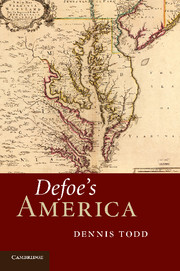Book contents
Preface
Published online by Cambridge University Press: 02 December 2010
Summary
Defoe was enthusiastic about the British colonization of the New World. He wrote extensively about colonization in his economic and journalistic works, colonial concerns infiltrated his religious conduct books, and England's colonial enterprise became the explicit subject of one of the last pieces he had his hand in, the massive Atlas maritimus et commercialis. Many of his novels have some sort of colonialist bent, and one of them, A New Voyage round the World, at times seems to have little more purpose than to promote one of Defoe's favorite projects, creating an English colony on the tip of South America. Robinson Crusoe, Colonel Jack, and Moll Flanders, too, have colonial American settings, all three taking place in what regional scholars call “the extended Caribbean” – the coastal region stretching from the eastern tip of Brazil north to the Chesapeake. This locale is the “America” of my title, and these three novels are my subject.
It is significant that these three novels take place here. The Caribbean of Robinson Crusoe and the Chesapeake of Colonel Jack and Moll Flanders were plantation monocultures, societies organized around the cultivation of sugar and tobacco. As a consequence, they were utterly dependent on bound labor. With historical hindsight, we understand how important African slaves were for the growth and success of these British possessions, something Defoe knew, too. “Our Collonies in America,” he acknowledged, “could no more be maintained … without the Supply of Negro Slaves than London could subsist without the River of Thames.
- Type
- Chapter
- Information
- Defoe's America , pp. viii - xPublisher: Cambridge University PressPrint publication year: 2010

